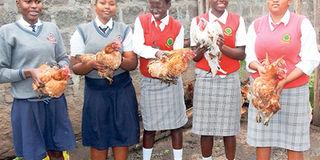School reaps from organic farming

Students of Shunem Girls’ Boarding High School in Lanet, Nakuru County showcase chicken they keep in their school farm. They began the chicken project in 2016 with 25 chicks that cost them Sh2,500. PHOTO | RICHARD MAOSI | NMG
What you need to know:
- The school that sits on nine acres and has a student population of 450 also rears 200 Kienyeji chickens, the source of the manure they use to grow vegetables.
- They began the chicken project in 2016 with 25 chicks that cost them Sh2,500. They increased the flock later, says Akuta.
- The challenges they face include lack of extension officers, diseases and lack of places to preserve vaccines before administration.
- Debbie Hellen, a Form Four student who takes agriculture, says they are taught how to feed and manage the chickens. This has taught them new skills.
About 15 kilometres from Nakuru Town in Lanet sits Shunem Girls’ Boarding High School.
The school keeps chickens and grows various kinds of vegetables organically. This has made them stand out as their crops are too leafy.
“All these vegetables have only been manured with chicken droppings. Our mission is to farm all our crops organically,” James Asuka, the principal, says, adding they mainly grow sukuma wiki (collard greens).
The school that sits on nine acres and has a student population of 450 also rears 200 Kienyeji chickens, the source of the manure they use to grow vegetables.
Once they harvest the manure, they decompose it for over three months and then use it to plant the vegetable seedlings. The land is also regularly manured.
Asuka says the need for an alternative source of protein for students and the ease of keeping chickens drove them to poultry. “Our students’ main food is tea, vegetables, fruits, meat and beans. We wanted something that could supplement their only sources of proteins, which are beans, meat and milk. Eggs were a good substitute.”
They began the chicken project in 2016 with 25 chicks that cost them Sh2,500. They increased the flock later, says Akuta.
WORK WITH A VETERINARY OFFICER
“The two projects are mutually beneficial to each other. We feed the birds with vegetables from the garden and use their manure to nourish the crops. This has saved us from buying fertiliser.” Each day, the school picks 150 eggs, with each student eating two eggs per week. Teachers and subordinate staff are also offered the eggs, says Akuta.

The students here in the farm where they grow vegetables. They mainly grow sukuma wiki. PHOTO | RICHARD MAOSI | NMG
“As a school, we save over Sh40,000 per term that could have gone to purchasing eggs. More savings come from the vegetables we harvest from the farm since we do not buy any when they are in season.
This has enabled us to invest the money into other important areas like buying lab apparatus,” he adds.
The challenges they face include lack of extension officers, diseases and lack of places to preserve vaccines before administration.
“These chickens are very susceptible to diseases like Newcastle and managing them can be an arduous task since they require experts.
But we work with a veterinary officer to ensure the chicks are healthy,” says the principal, noting they have employed one worker to look after the birds.
Debbie Hellen, a Form Four student who takes agriculture, says they are taught how to feed and manage the chickens. This has taught them new skills.
Julius Omuko, a poultry specialist with Kimunju Enterprise in Nakuru, says chickens are a good source of income and food at schools and that they are very easier to manage.
“For good poultry farming, cleanliness is key since these birds are susceptible to diseases like Newcastle, gumboro and marek.”




